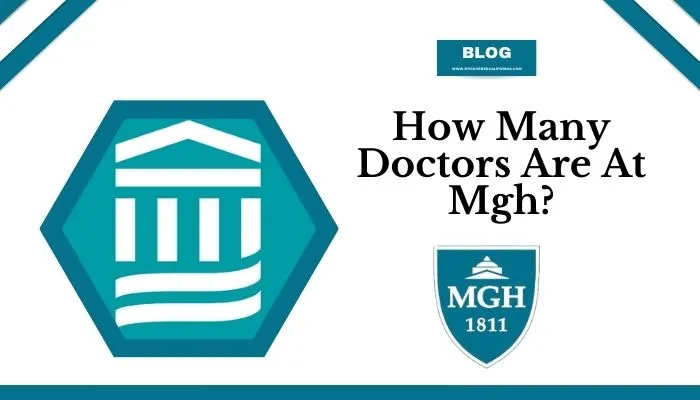How Many Doctors Are At Mgh? Massachusetts General Hospital (MGH) is an institution in the healthcare sector. It has a reputation for cutting-edge research, excellence in patient care, as well as a history of medical advancements that attract patients who want the best medical attention possible.
However, there is one important question behind this reputation: how many physicians are required to maintain its smooth operation?
Knowing the number of doctors at MGH is not just about numbers on paper. It’s about taking care of thousands of patients. This article discusses the importance of doctor availability at MGH how it affects patient care and factors influencing staff doctor strength.

How Many Doctors Are At Mgh?
Think of an overcrowded waiting room with patients overflowing and only one doctor on call juggling several cases. This case outlines the importance of the patient-doctor ratio.
The number represents the average number of individuals that can be attended by a single physician within a given period. A healthy ratio will ensure:
| Benefit | Description |
|---|---|
| Improved diagnosis | Appointments that are hastily done result in a missed diagnosis or wrong assessment. |
| Better patient satisfaction | A less hurried doctor can answer questions and resolve concerns for their patients more effectively resulting in a good experience. |
| Decreased hospital readmission rates | Initial comprehensive care often reduces the need for subsequent admissions. |
| Better preventive care | More time available for physicians enables them to intensify efforts aimed at early identification or even prevention of diseases. |
| Higher survival rates among patients | Timely intervention by qualified medics becomes crucial during emergencies or when dealing with complicated medical conditions. |
Doctor Availability
Apart from the patient-to-doctor ratio, availability also impacts heavily on quality healthcare. Here’s how:
Lower wait times: A sufficient number of doctors means shorter times spent in queues; hence, patients get attended to in time. This is particularly important for emergency cases or patients with chronic illnesses who need frequent check-ups.
Accessing specialists: MGH refers to many complex cases internally. With different specializations having adequate staff numbers, patients can conveniently find the care they require.
Better treatments: Continuity of care where a patient sees the same doctor over a long period enhances trust and understanding. In situations like this when continuity is possible, patients are more likely to be open about their medical problems.
Nevertheless, doctor shortages can have several repercussions:
Exhausted physicians are prone to letting down their clients thus compromising on the quality of care provided. Busy physicians are not always up-to-date with new drug inventions or treatment methods as much as they would desire due to ever-running schedules.
Some public health facilities usually lack enough medics resulting in worse health outcomes and limited access to preventive as well as specialized care.
Factors Influencing Doctor Quantity at MGH
Achieving the right number of doctors at MGH is a difficult balancing act. Here are some key factors:
- Population and patient needs: MGH serves a diverse range of patients with varying complexities in terms of medicine. The demand will fluctuate naturally depending on these factors.
- Specialization: MGH is a major referral hospital, hence the need for a large number of various medical disciplines specialists.
- Technological advancements: In this case, telemedicine and virtual consultations are some of the technological developments that can expand physicians’ reach making them able to see more patients without necessarily decreasing quality.
Hiring highly qualified doctors is expensive. There has to be a way that hospitals like MGH will find out how they can support having enough doctors by developing sustainable financial models.
Looking to the future
Healthcare delivery is always changing. MGH will probably continue adapting its staffing model for physicians to meet the changing needs of its patients and the medical industry as it remains at the forefront of modern medicine.
It remains vital for MGH to strike a balance between doctor number and quality care if it wants to keep being known as a symbol of medical excellence.
Counting the Keepers of Care
This involves considering different aspects when counting physician quantity at MGH:
- Physician directories: These online directories are helpful though not accurate since they don’t include part-time staff, fellows, or those on leave.
- Hospital reports: Although these may not break down numbers by specific doctor categories, annual reports published by MGH usually contain staffing information.
- External databases: Databases let organizations track trends in the physician workforce.
By extrapolating from such data sources like the American Medical Association (AMA) or the Association of American Medical Colleges (AAMC), it becomes possible to estimate doctor distribution according to geography and specialty across all hospitals including MGH.
What determines the optimum number of doctors at MGH?
The ratios of residents to attending physicians, the use of nurse practitioners by MGH, and the adoption of telemedicine influence the number of physicians needed. The number of doctors required is greatly affected by the nature of patients’ cases and the range of specialties offered in MGH.
For instance, oncologists would be more if there were more oncology departments.
Hospitals need to be able to retain highly qualified professionals who will then become available as doctors. These issues include competitive salaries, strong mentorship programs, and a positive work environment.
Maintaining such a big staff comes with great cost implications. While doing this other budgetary needs should also be considered by MGH when it wants to find sustainable financial models that can cater to enough numbers of doctors.
Understanding these factors is crucial for MGH to strike the right balance between doctor quantity and quality care. It’s a continuous process requiring careful data analysis, strategic planning, and a commitment to attracting and retaining top medical professionals.
MGH vs. the Healthcare Landscape
However, understanding just how many doctors are there in MGH in isolation is limited; let’s compare it with similar institutions:
Mass General Brigham Healthcare System’s counterpart to MGH reportedly employs more than four thousand physicians. This means that the MGH doctor count may be within the same range as this one.
Renowned for their vast specialist teams, top-ranked medical centers such as the Mayo Clinic or Cleveland Clinic may have more staff than MGH.
Navigating the Challenges and Opportunities
On different occasions, the number of medics can present both challenges and opportunities:
| Challenges: Insufficient medical staff can cause increased waiting times, reduced access to specialized services, and potential exhaustion among current workforce members. |
| Opportunities: Telemedicine advances might enable physicians to see more patients without compromising their work quality. |
This is one reason why strategic planning is important for facilities like MGH that are in the healthcare industry.
Policy Implications
The issue of how many doctors continues beyond MGH in terms of health planning:
- Resource allocation – For example, consider regionally distributed doctors across fields as well as sub-specialties so that all citizens may equitably benefit from them;
- Workforce development – This will involve persuading medical students to go into high-demand specialties (Howden & Mylonakis 2009);
- Financial models – Sustainable models that fund enough physicians’ activities are necessary (Rosenberg & Meisel 2015).
By recognizing the importance of the quantity of doctors and its impact on patient care; Medical centers such as MGH aim to develop an environment that encourages excellent service delivery, attracts outstanding performers, and ensures improved welfare for patients.
Ultimately striking a balance between numbers and quality continues to be key in upholding MGH’s legacy in medicine.
Conclusion
How Many Doctors Are At Mgh? Several doctors at MGH are never without their complexities, as this exploration indicated. We had a chat about how significant it is to have adequate numbers of doctors who are the main actors in patient care, the difficulty in determining an exact number, and several elements that influence that number.
MGH likely has thousands of doctors employed according to estimates; patient complexity, specialty services, and financial constraints impact these staffing requirements. Broadens perspectives by comparing MGH with similar institutions and analyzing trends.
The optimization of its doctor staffing model remains a focus for MGH because it aims at maintaining the best performance in the medical field.

Hello, I’m Curtis Wallace, your go-to support for MGH Patient Gateway. With a commitment to streamlined healthcare processes, I’m here to guide you through your patient portal journey.